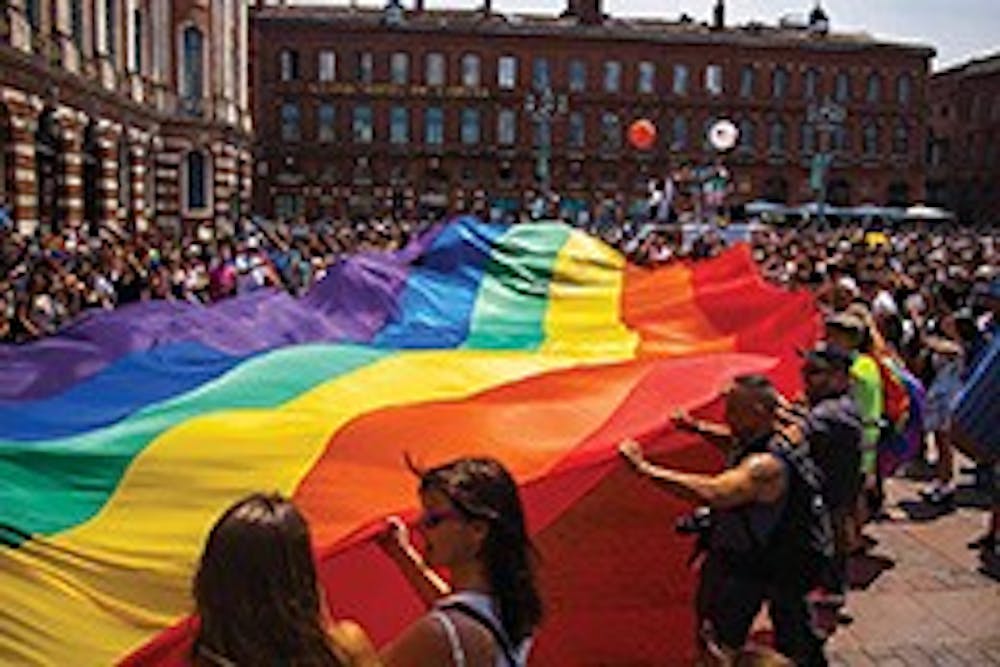Maker of the iconic rainbow flag used to represent the LGBT community, Gilbert Baker, died in New York City over the weekend, which reminded many people of the long history of LGBT Americans’ fight for equality.
Alongside San Francisco Mayor Ed Lee, dozens of people held a vigil in the city to pay respect to the activist, according to ABC News. Baker created the flag in 1978 and the symbol was ultimately adopted by LGBT people from around the world.
“[The flag] is the embodiment of the LGBT community,” Lee said, “and it has become a source of solace, comfort and pride for all those who look upon it.”
While the flag unified a community and allowed many disenfranchised people to fight for rights and respect under one banner, the history of LGBT Americans goes back for decades before the flag’s inception.
The American Civil Liberties Union (ACLU) first fought for LGBT rights in 1936, according to the organization’s website, aclu.org. Despite decades of court battles and a campaign launched in 1986 to give equal rights to LGBT Americans, the battle is apparently ongoing.
“Today, the ACLU brings more LGBT cases and advocacy initiatives than any other national organization does,” the ACLU website states.
But in 2017, how could the government or private citizens still be diminishing or restricting the rights of its people? After all, the Supreme Court legalized marriage for homosexuals in 2015, so what rights are left to fight for?
The answer is, quite a few. Most recently, the United States Census Bureau announced last week it would not be including questions on the 2020 census to identify sexual orientation or gender identity, according to The Huffington Post.
On the one hand, such questions could be seen as irrelevant and an invasion of privacy into people’s personal lives. On the other hand, not including the questions could further marginalize LGBT Americans. When there are questions for race, ethnicity, age and a host of other demographics, not including questions concerning LGBT people does not make a lot of sense.
Obtaining information about LGBT Americans could help organizations fight for their rights, and educate the public by simply knowing who they are and how many of them exist. It could also aid the government in enforcing LBGT protection laws, but that may be a moot point considering President Donald Trump just took another one of his predecessor’s executive orders and threw it into the Oval Office’s fireplace to burn into the ashes of history.
Former President Barack Obama’s 2014 executive order prohibited the federal government from employing firms and contractors that discriminated against LGBT people, reported Rolling Stone magazine. But, according to magazine writer David Cohen, this wasn’t actually the order Trump repealed. Obama signed a second executive order, which Trump did tear up, that forced the contractors to provide evidence that they do not discriminate.
In a nutshell, federally employed contractors and firms are not allowed to discriminate on the basis of sexual orientation or gender identity, but they are no longer required to prove they do not discriminate. That is the equivalent of a minor not being allowed to buy alcohol, but he or she does not have to verify his or her age with the store clerk.
In other words, if some bigoted employer wanted to start discriminating against LGBT workers or applicants for a position, he or she could do it and have a much greater chance of getting away with it.
The LGBT community, like all marginalized groups, live in a world of tentativeness — never quite sure if their cause is making progress or is being attacked. It is no wonder these groups need safe havens and centers to come together to express their concerns.
Shippensburg University’s LGBTQ+ Concerns Committee offers a range of online services and links to resource pages for students. It includes a definitions tab for understanding LGBT culture and identity, among a list of educational tools.
It is a good place to go to learn more about the LGBT community, and to know what it means to walk under the rainbow flag.



The Slate welcomes thoughtful discussion on all of our stories, but please keep comments civil and on-topic. Read our full guidelines here.